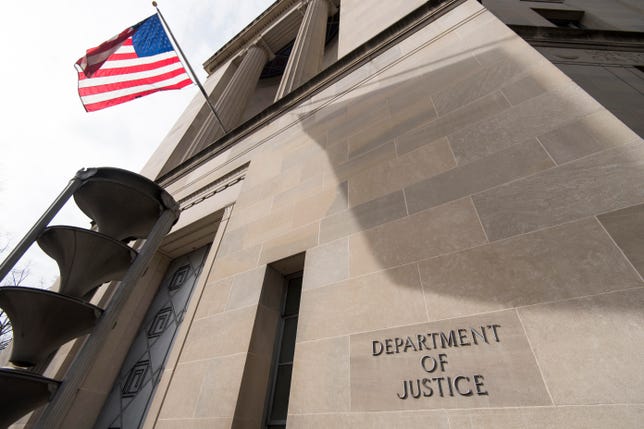
Will crypto be the Super Bowl's biggest winner? This week's top cryptocurrency news
Welcome to Nonfungible Tidbits, a weekly roundup of cryptocurrency, NFTs and their related realms.
Our lead story is Sunday's Super Bowl and all the crypto ads viewers will see. And, while we're on the topic of crypto and pro sports, the Washington Nationals baseball team also partnered with a decentralized autonomous organization. We'll cover the Nats' sponsorship deal and what a DAO is.
This week's roundup also features the Justice Department's biggest bust in history, as well as a new coalition of crypto companies that aims to fight market manipulation.
In other news, the World Wildlife Fund decided to shutter its NFT project after a backlash due to the tokens' potential environmental impact.
Here's what caught our eyes this week. Stay tuned for more next week.
Crypto firms gear up for the big game

No fewer than five crypto ads are reportedly scheduled to air at Sunday's Super Bowl, where the Los Angeles Rams face off against the Cincinnati Bengals. According to multiple media reports, FTX, Coinbase, eToro and Crypto.com are expected to have ads during the big game's US broadcast, while Toronto-based Bitbuy reportedly purchased an ad for the Canadian broadcast.
Advertising during the Super Bowl, one of the most watched television events of the year, is eternally expensive. This year, a 30-second spot is going for about $6 million -- a new record and a small fortune for some businesses.
Tech companies have long used the Super Bowl to enhance brand recognition. During the dot-com bubble of the late 1990s and early 2000s, a host of fledgling firms advertised during the big game. Perhaps the most memorable was a 2000 commercial by Pets.com, an early e-commerce company that went bust just a few months later.
An expected 117 million Americans will tune in to the match this Sunday. With crypto going mainstream -- 16% of Americans have invested or used cryptocurrency, according to Pew Research Center -- the Super Bowl may prove an effective way to reach an even broader audience.
Washington Nationals team up with a DAO. What's a DAO again?

It looks like baseball is trying to keep up with football's crypto enthusiasm. With spring training right around the corner, the Washington Nationals baseball team announced a partnership with Terra, a cryptocurrency enterprise. Fans will be able to use Terra's UST stablecoin at the team's ballpark, which will feature prominent Terra promotions near home plate.
Terra is a DAO, or a decentralized autonomous organization that makes decisions via a consensus vote using digital tokens on a blockchain. The Terra DAO voted on the sponsorship, and the organization paid the Nats nearly $40 million.
The Nats-Terra deal follows last November's deal between LA Angels star Shohei Ohtani and FTX, a cryptocurrency exchange. Ohtani, who made history last season as the first player ever selected as both an All-Star pitcher and hitter in the All-Star game, signed on to be FTX's global ambassador and took a stake in the company.
Last year, FTX also became Major League Baseball's official cryptocurrency exchange -- the first deal of its kind between an American pro sports league and a crypto exchange.
A $3.6B bitcoin seizure is Justice Department's biggest bust ever

The Justice Department seized $3.6B in bitcoin from a digital wallet held by a couple living in Manhattan, the department said on Tuesday. The suspects, who allegedly were trying to launder the crypto loot, are a husband and wife team, one of whom was an aspiring rapper on YouTube. The seized bitcoin has been linked to the 2016 hack of Bitfinex, when hackers spirited almost 120,000 bitcoin from the cryptocurrency exchange. The bust is the largest in the department's history.
Read CNET's full story on it here.
Canada accounting giant buys bitcoin and ether

KPMG Canada, the Canadian division of the Big Four accounting firm, said Monday it had added cryptocurrency to its holdings. KPMG Canada didn't specify the amount of crypto it had purchased but said it had also bought carbon-offset credits to "maintain a net-zero carbon transaction." Carbon offsetting refers to the practice of buying credits from another company or organization that's engaged in greenhouse gas reduction, with the credits representing a kind of commoditized carbon reduction.
Crypto firms form coalition

Coinbase, Circle, and 15 other crypto companies founded a new coalition, according to an announcement this week. The Crypto Market Integrity Coalition aims to address the issues raised by New York Attorney General Letitia James, SEC Chair Gary Gensler and other officials, who worry the industry is plagued by market manipulation. The coalition requires members to sign a written pledge, and according to the coalition's website, more than 350 organizations have already joined.
Thanks for reading. We'll be back with plenty more next week. In the meantime, check out this story on what quantum hackers could mean for bitcoin by CNET's Monisha Ravisetti.
Source
Tags:
- Super Bowl 2022 Crypto
- Crypto Advertisements Released Super Bowl
- Super Bowl 2022 Crypto Commercial
- Crypto Advertisements Released Super Bowl
- Super Bowl 2022 Crypto Ads
- Super Bowl Crypto
- Will Crypto Be The Future
- Crypto Super Bowl Commercial
- Which Crypto Will Be The Future
- What Will The Crypto Market Cap Be In 2025
- Will Crypto Be The Future Currency
- Will Crypto Com Go Bankrupt






